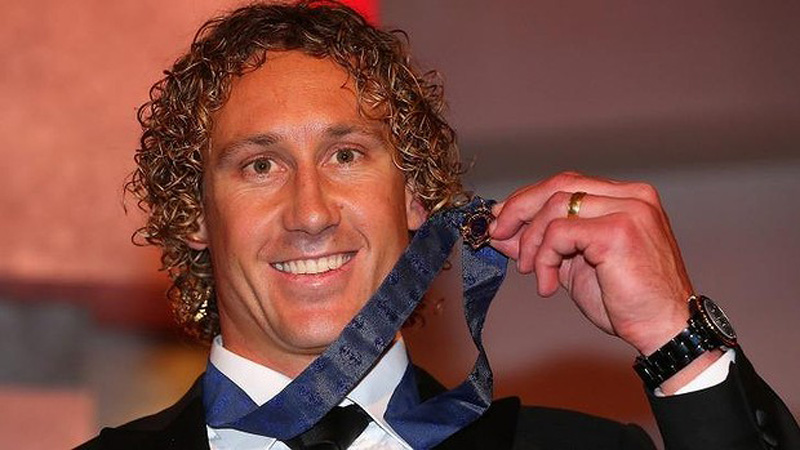A relentless West Coast midfielder considered good enough to make the All-Australian squad but not great enough to make the final team has won the AFL’s highest individual honour, the Brownlow Medal.
Matt Priddis looked set to inherit the award because leader Nat Fyfe had defaulted due to suspension. But the spectre of an ineligible player finishing atop the vote tally disappeared when the profilifc possession-winner and clearance-winner snared two votes in the last round of the year to become the outright winner of the award, rather than just the first player to fulfil both the best and fairest criteria.
“It’s obviously a huge honour, and something I’m very proud of,” he said on Monday night, when accepting the award.
Priddis’ coach at the Eagles, Adam Simpson, was rapt with the award, but pointedly said it “makes you question the All-Australian panel”.
Priddis arrived at the event with moderate hopes, believing he had only a “consistent year”. The umpires disagrees, awarding him votes in 13 of his 22 matches, four of them as best afield.
The widespread conjecture in the second half of the season that Fyfe, as the recipient of arguably the year’s most contentious suspension, could be therefore blocked from being the recipient of the Brownlow, as Chris Grant and Corey McKernan infamously were in the late 1990s, was explained by his dazzling form in the second half of the season. Between rounds 13 and 20 he polled in six matches, and was judged best afield in four of them, to surge to 25 votes. It was there he stayed as, he missed the last two matches due to another suspension, albeit a much more straightforward striking charge.
Given Fyfe’s ineligibility, the joint runners-up for the award were Gold Coast’s Gary Ablett and Sydney’s Lance Franklin on 22 votes, followed by four revered midfielders on 21 votes: Port Adelaide’s Travis Boak, Adelaide’s Patrick Dangerfield, Sydney’s Josh Kennedy and Geelong’s Joel Selwood.
While Priddis missed out on two drafts, and in the meantime had to work on a building site, he said his overriding goal was that he was “going to play at the highest possible level I could be at”, even if that was just in the WAFL.
“I was never going to give up because it was absolutely a childhood dream,” he said.
Since belatedly getting his AFL chance, however, he has proved his worth at the highest level.
Besides many former coaches a key recipient of praise from Priddis who was his partner of 12 years and now wife Ashleigh, who was absent due to pregnancy with the second child, after daughter Nala.
“My best two years of footy have been since the birth of my first child,” Priddis said. “They just give me so much balance.”
Selwood polled in all of Geelong’s first four matches to steal an early march on his rivals, before he was predictably overhauled by defending champion Gary Ablett.
Given Ablett was sidelined for the last seven rounds of the year a fast start was essential to his hopes of saluting. He did not disappoint, gaining four best-on-grounds in the first six weeks of the season. By round seven he had 14 votes, the most ever recorded at that stage of a count.
Sydney’s Kennedy regularly featured in the votes, six times in the opening nine rounds, but only two of those were best afields.
Swans spearhead Franklin polled only once in the opening seven rounds, an unsurprising result given his mediocre start to the season. His emphatic recovery began by polling in three consecutive matches from round eight.
In the first half of the season the biggest bolter in the leaderboard was Dangerfield, who by round nine he had also reached 14, only for Ablett to move to 17 with a fifth three-vote match. GWS captain Callan Ward was similarly rewarded, despite playing in a lowly team, to poll three early best-afields, and then a fourth and fifth in rounds 13 and 14 to, already by that stage, record the Giants’ best result with 15 votes.
Ablett’s start to the second half of the year did not begin as strongly as he would have hoped, gaining only one vote for a 37-disposal match in the Suns’ decisive loss to Sydney. The umpires’ preference in that match for Kennedy allowed the bullocking midfielder to join Dangerfield in joining second position, four behind Ablett – a buffer that, barring a dominant last month before injury, looked set to be overhauled, and duly was.
The lack of recognition for Selwood after the first match was systemic. It was not until round 17 that he topped the votes again, but then again missed maximum votes in the next two matches despite gathering a total of 68 disposals.
In the night’s other awards, the mark of the year was given to Port Adelaide’s Chad Wingard for his ride atop St Kilda’s Sean Dempster, the goal of the year by Port Adelaide’s Matt White for his three-bounce effort against Richmond, and the Jim Stynes Community Leadership Award by injury-plagued West Coast defender Beau Waters.
This story first appeared in The Age.








